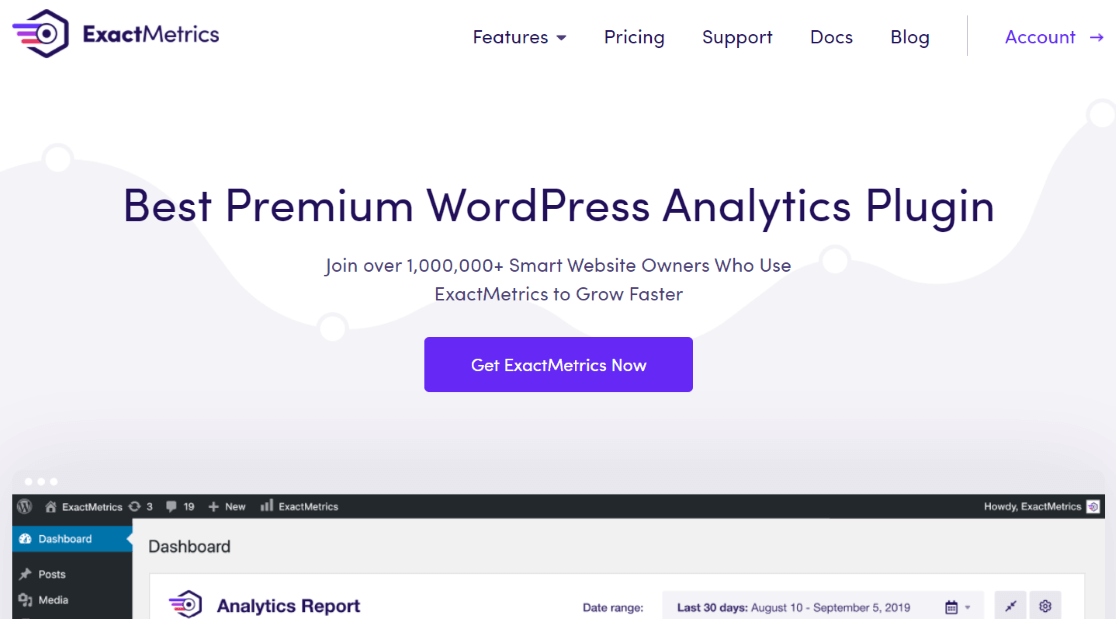Are you interested in learning about topical authority to improve your search engine rankings?
While it might initially seem complicated, nailing topical authority significantly enhances your website’s performance. Essentially, it involves establishing your site as a trusted resource on specific subjects. When you achieve this, search engines like Google are more likely to rank your site higher.
In this guide, we’ll explore the fundamentals of topical authority, outline how Google evaluates and ranks your website, and share the top strategies for boosting your topical authority.
These are the points we’ll cover:
- Why Topical Authority Matters
- How Google Ranks Your Site in Search
- How to Build Topical Authority and Rank Higher
- How to Track Rankings and SEO Performance
Why Topical Authority Matters
Topical authority means positioning yourself as an expert in a particular subject area. When your website provides comprehensive and valuable information on a particular topic, search engines view it as a credible source, which helps your site rank better in search results.
Let’s say you have a cleaning blog. By sharing detailed articles on various cleaning methods, tips for tackling different types of stains, seasonal cleaning advice, and solutions for common household cleaning problems, your site can become a preferred destination for cleaning enthusiasts.
Search engines recognize that your site thoroughly covers numerous cleaning topics, which leads to higher rankings when users search for related information.
This happens because search engines like Google favor content that aligns closely with users’ queries and keeps them interested.
This is particularly beneficial if you run a small business or website. Even websites with low Domain Authority (DA) can outperform those with higher DA if they excel in topical authority.
For instance, a small cooking blog offering detailed recipes, cooking tips, and nutritional advice can outrank a bigger site with only basic recipes. This occurs because search engines prioritize relevant and high-quality content.
If your content is informative and engaging, visitors will stay on your site longer, indicating to search engines that your site holds value.
Next, let’s delve into how Google ranks websites and their most recent updates.
How Google Ranks Your Site in Search
Google uses several criteria to determine your site’s ranking. Factors such as high-quality content, fast loading speeds, mobile friendliness, and an overall positive user experience play pivotal roles. In essence, Google aims to present users with the most reliable and helpful content possible.
One significant aspect to consider is Google’s latest helpful content updates. These updates are designed to emphasize content that is useful, informative, and directly relevant to users’ search queries. If your content meets these criteria and genuinely assists users, it is more likely to achieve a higher ranking.
E-A-T, which stands for Expertise, Authoritativeness, and Trustworthiness, is another critical ranking factor.
Google favors content produced by knowledgeable experts, authoritative figures, and credible sources. This underscores the importance of having strong topical authority, as it signals to Google that your site is a leader in its specific area.
Understanding search intent is equally important. This involves knowing what users are looking to find when they enter a query into Google.
Are they searching for detailed information, looking to buy a product, or seeking something else entirely? By aligning your content with the searcher’s intent, you increase the chances of your site being ranked higher.
How to Build Topical Authority and Rank Higher
Now that you understand the basics of topical authority and its importance in SEO let’s dive into practical steps you can take to build it.
Here’s what we’ll cover:
- Conduct Thorough Keyword Research
- Build Out Your Content Cluster
- Get Backlinks to Your Content
- Use a Strong Internal Linking Structure
1. Conduct Thorough Keyword Research
Conducting keyword research is foundational to building topical authority. Before writing content, it’s crucial to understand what your audience is searching for.
First, consider your audience’s interests. What questions do they have? What information are they seeking? Your goal is to provide comprehensive coverage of all this.
Start by selecting an effective seed keyword. This is a broad term that encapsulates your entire topic.
For example, if your subject is “home workouts,” a good seed keyword might be “beginner exercise routines.” Avoid terms that are too generic, like “fitness,” or overly specific, like “yoga poses for lower back pain.”
After selecting a seed keyword, broaden your list of related topics. For “home workouts,” potential topics might include:
- Exercises for small spaces
- Quick workout routines
- Essential home workout equipment
- No-equipment workouts
Struggling to find more related topics? Here’s a helpful trick:
- Visit Google Images.
- Enter your broad topic.
- Look at the suggested filters. These often provide related ideas worth exploring.
For instance, see what happens when you type in “baking recipes”

Why not consider focusing on easy or no-bake cake recipes with few ingredients? You can even do a seasonal series for summer, winter, and fall or “Fun Halloween Cake Recipes.”
For more in-depth keyword research, we recommend using a tool like Semrush. This tool shows the search volume for each keyword and indicates how competitive it is to rank for.
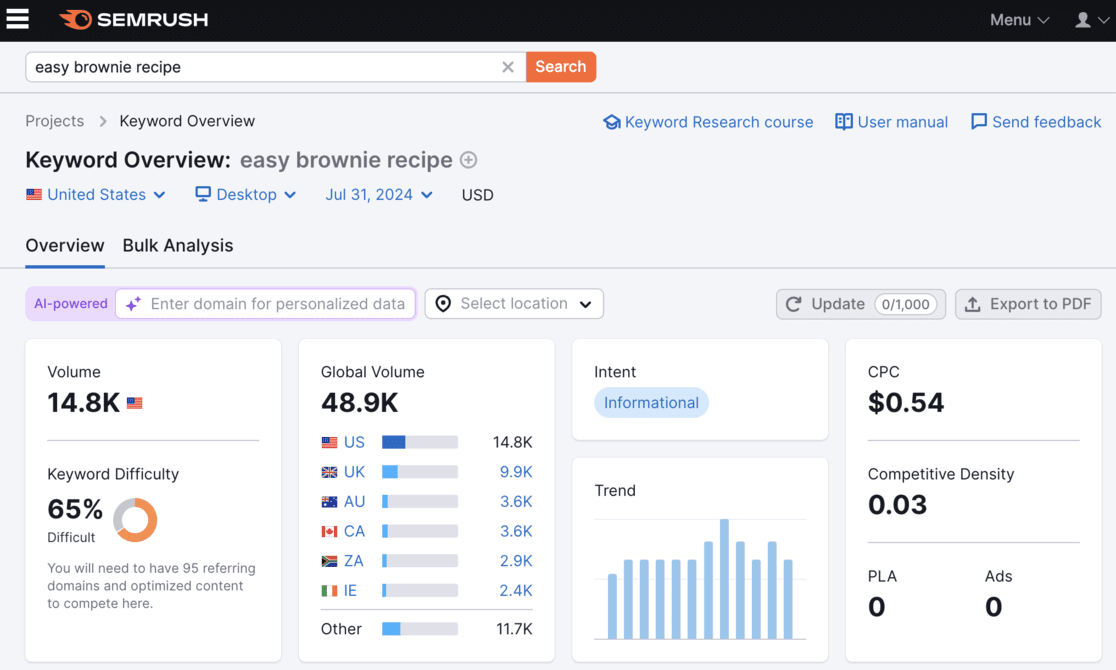
Additionally, examine the articles that rank well for your chosen keywords.
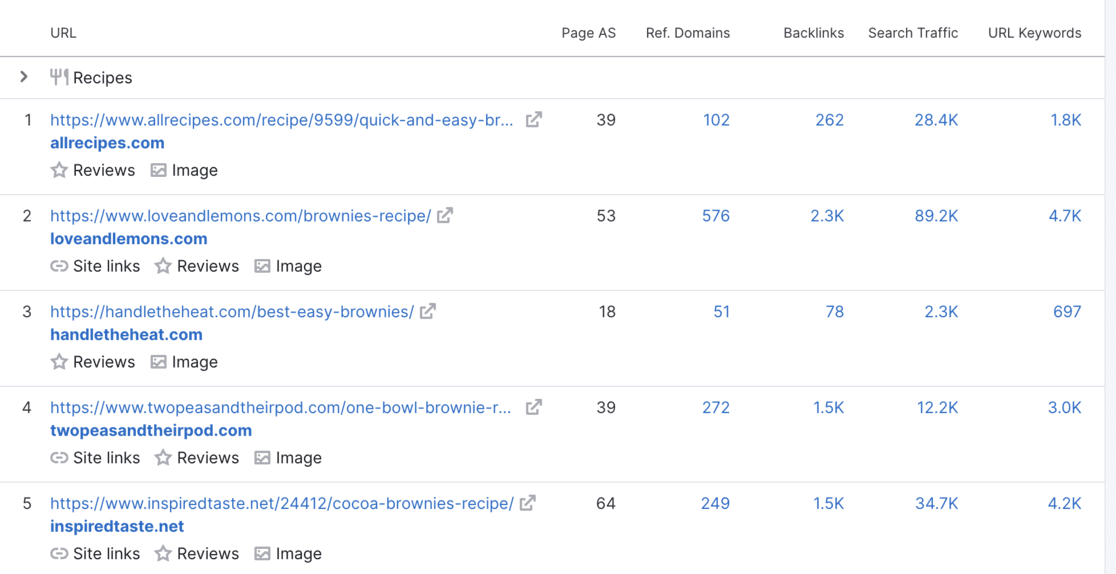
Study these top-ranking articles to understand what they cover, how they structure their content, and how they use headings. This insight reveals what both Google and users expect when searching for these terms.
By analyzing these successful articles, you can create content that meets or exceeds these standards, thereby building your topical authority in the eyes of search engines.
For more detailed information, check out our guide on SEO Tips to Drive More Business.
2. Build Out Your Content Cluster

To establish strong topical authority, you must create a content cluster. This involves developing a mix of pillar articles (also known as cornerstone content) and supporting articles that are interlinked.
Pillar Articles: These are extensive, comprehensive pieces that cover a broad topic in-depth. They act as the central hubs of your content cluster.
For instance, if your site is centered on personal finance, a pillar article might be “The Ultimate Guide to Personal Finance.”
Supporting Articles: These shorter, more focused pieces delve into subtopics related to your main pillar article.
For example, in the realm of personal finance, supporting articles could include “How to Create a Budget,” “Understanding Credit Scores,” and “Tips for Saving Money.”
Check out our comprehensive tutorial on Cornerstone Content for SEO: What It Is & How to Create It for more insights.
Organizing your content into clusters results in a well-structured, interconnected information web.
This approach aids search engines in reading your site’s structure while keeping readers engaged, encouraging them to explore more content and enhancing your authority on the subject.
How many articles do you have to write to create an authoritative content cluster? There’s no fixed number, but a good indication is when your new content on a topic starts ranking easily. That’s a sign you’ve built topical authority.
3. Get Backlinks to Your Content

Securing backlinks is one of the most challenging aspects of SEO. It can be a slow and seemingly daunting process, often feeling out of your control. However, there are effective methods to get high-quality backlinks.
Here are some actionable tips:
- Guest Blogging: Write articles for other blogs and websites within your niche. This helps you tap into a broader audience and gets you valuable backlinks.
- Create Exceptional Content: The most organic way to acquire backlinks is by creating content that others want to link to. This can include comprehensive guides, original research, engaging infographics, or other highly valuable articles.
- Leverage HARO and Qwoted: HARO (Help A Reporter Out) and Qwoted are platforms that link journalists with sources. By offering expert quotes or insights, you can get featured in articles, gaining valuable backlinks in the process.
- Promote Your Content: Share your articles via social media, participate in relevant forums, and distribute your content through email newsletters.
- Build Relationships: Network with other bloggers and influencers in your industry. Engage with their content, leave thoughtful comments on their blogs, and share their posts. This might attract more attention and earn you a great backlink in the future.
Implementing these strategies can help you get backlinks that enhance your site’s SEO and help establish your topical authority.
For more detailed strategies, read our complete guide on Marketing Hacks For Explosive Traffic Growth.
4. Use a Strong Internal Linking Structure
Internal linking is vital for both enhancing user experience and boosting SEO.
By linking different pages within your website, you can guide visitors to more relevant content, thereby increasing their time on your site.
This improves user engagement and helps search engines comprehend the structure and hierarchy of your content.
When creating internal links, utilize descriptive anchor text that informs the reader about the content they will find when clicking the link. For instance, instead of interlinking with the word “here,” describe what you’re linking to, such as our article on “writing a killer headline.” Search engines pick up on the anchor text of your links and use it to understand your content and site’s structure.
Additionally, avoid linking to unrelated content. While it might be tempting to connect everything on your site, it’s important to stay focused. Linking to irrelevant pages can confuse your visitors and provide a poor user experience.
For WordPress users, explore our guide on How to Use WordPress Internal Links for SEO.
In addition, we recommend using the All in One SEO (AIOSEO) plugin to assist with on-page SEO and internal linking. It’s an excellent WordPress SEO plugin that simplifies site optimization.

AIOSEO helps create XML sitemaps, add schema markup, integrate social media, and track broken links.
Its Link Assistant tool provides customized suggestions for interlinking your content, ensuring a cohesive and well-connected website structure.
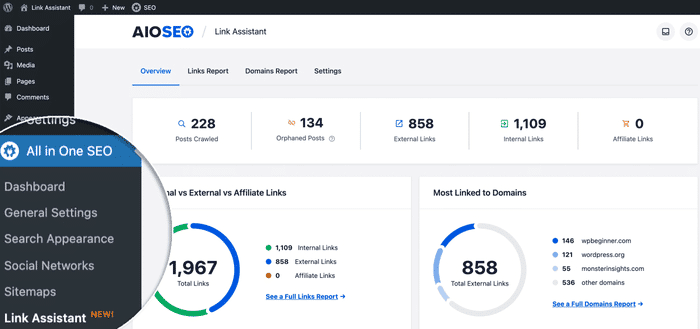
How to Track Rankings and SEO Performance
Now that you know how to build topical authority, it’s crucial to monitor your website’s performance.
Tracking how well your pages rank and the amount of traffic they receive allows you to make informed decisions to enhance your SEO strategy.
Let’s explore the best methods to track your SEO performance.
ExactMetrics for WordPress Users
If you’re using WordPress, ExactMetrics is the best choice. This leading Google Analytics plugin for WordPress simplifies the process of integrating your site with Google Analytics.
With ExactMetrics, you can access valuable reports directly from your WordPress dashboard without needing to navigate Google Analytics separately.
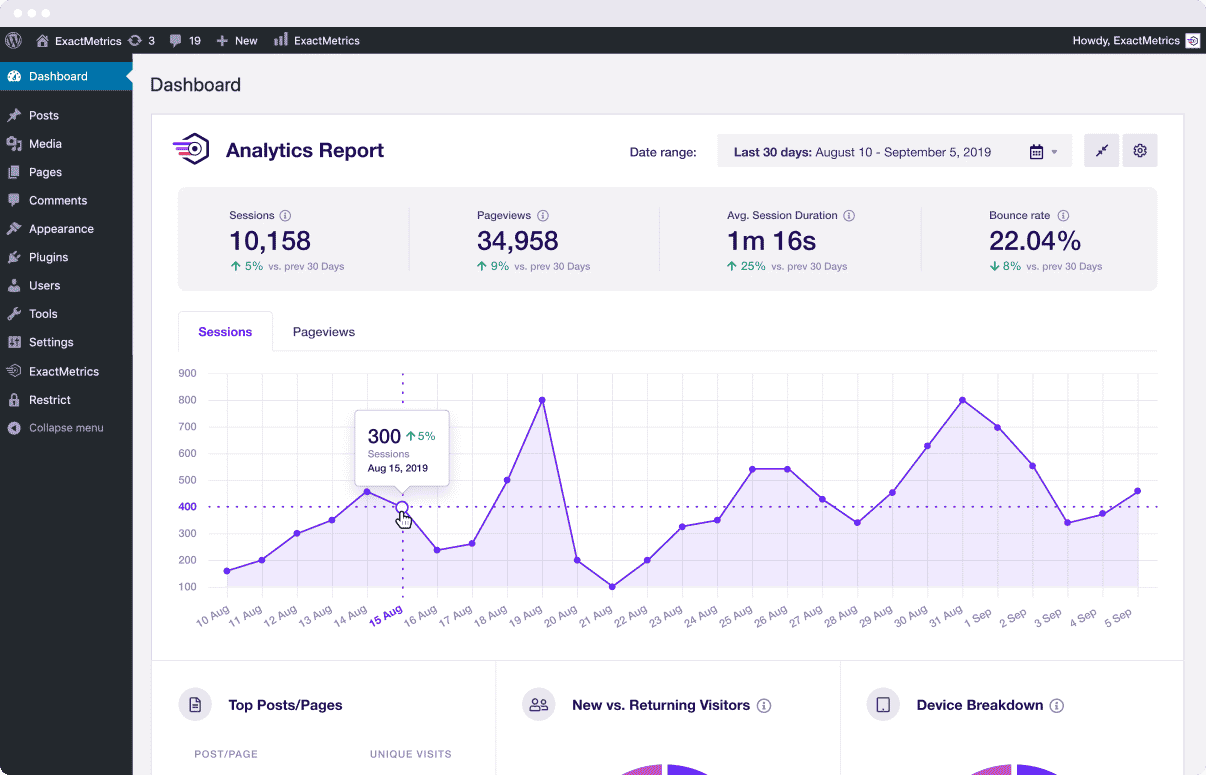
ExactMetrics delivers detailed reports tailored to your needs, including real-time analytics, bounce rates, eCommerce metrics, site speed evaluations, and essential SEO key performance indicators (KPIs) such as keyword rankings.
The tool is particularly user-friendly and enables advanced tracking features with a few clicks. You can easily monitor form submissions, author views, outbound link clicks, and WooCommerce activities.
One notable feature is the Search Console Report, which shows your top 50 Google search terms directly within your dashboard, displaying clicks, impressions, CTR, and average ranking position.
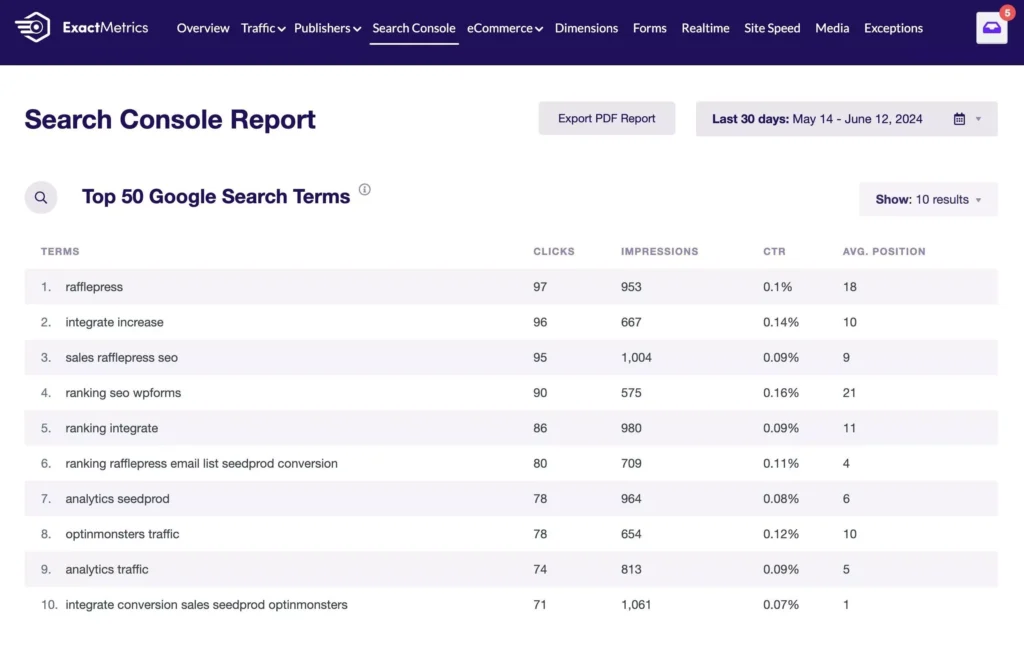
This feature is invaluable for identifying which keywords are performing well and which require more attention to enhance your CTR and rankings.
ExactMetrics also offers focus keyword tracking, allowing you to monitor your keyword rankings effortlessly.
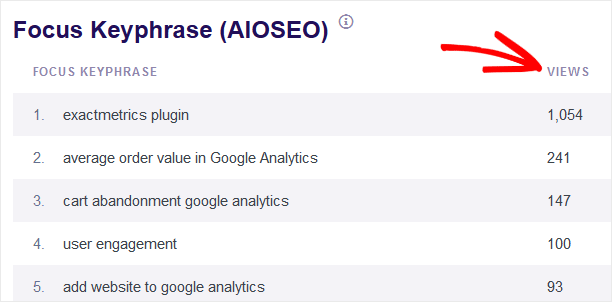
Get started with ExactMetrics today!
Google Analytics and Google Search Console for Non-WordPress Websites
For those not using WordPress, the combination of Google Analytics and Google Search Console is pretty effective.
These tools provide essential information about your website’s performance, offering insights into ranking keywords, user behavior, impressions, click-through rates (CTR), and more.
Google Analytics allows for detailed tracking of your SEO performance, and you can create custom reports to tailor the data to your specific needs.
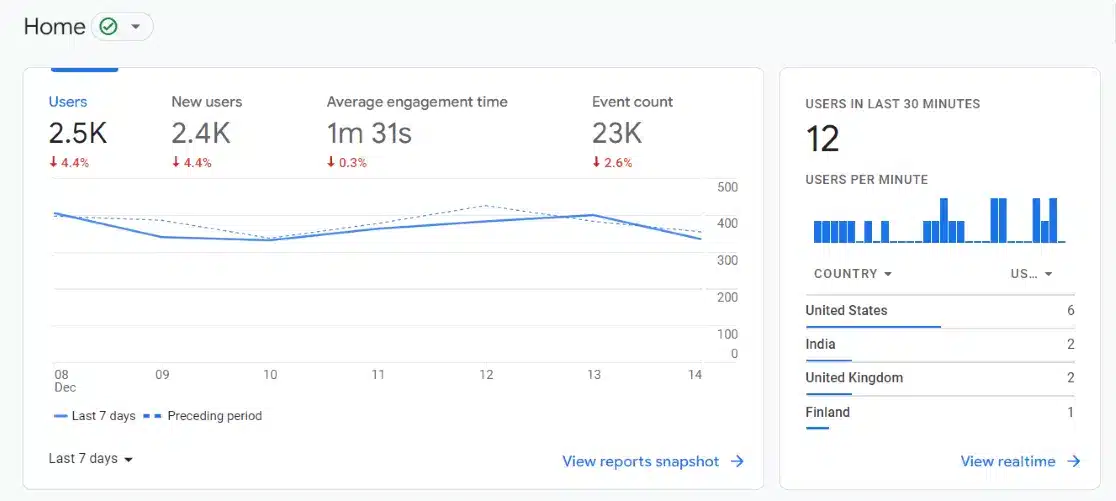
Google Search Console offers in-depth insights into how your site appears in search results, helping you understand what works well and what may need enhancement. This information is crucial for fine-tuning your SEO strategy and improving your website’s visibility.
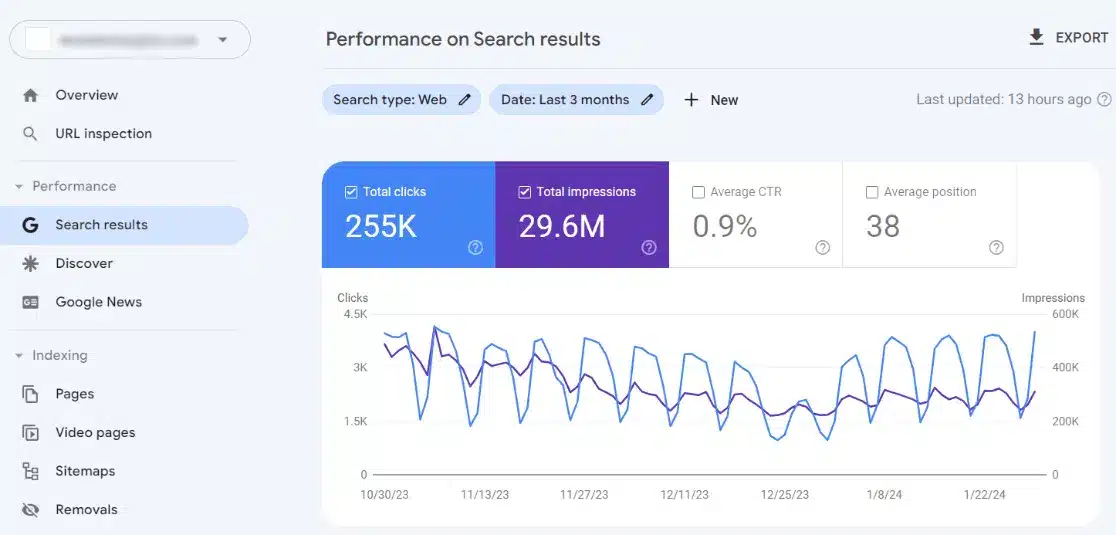
And that wraps it up!
We hope you found our guide on topical authority and SEO informative and helpful. If you enjoyed it, you might also be interested in reading:
- Best WordPress SEO Plugins & Tools to Rank Better
- How to Use Google Analytics and AI For Website Growth
- 18 Simple Ways to Use Google Analytics for Business Growth
- 12 Key Google Analytics Metrics Every Business Should Track
Haven’t you started using ExactMetrics yet? Now is the perfect time!
Don’t forget to follow us on X and Facebook to see all the latest Google Analytics tutorials.


